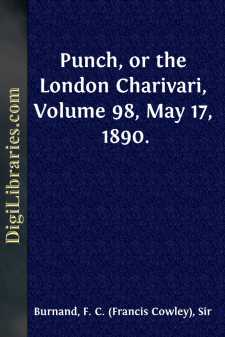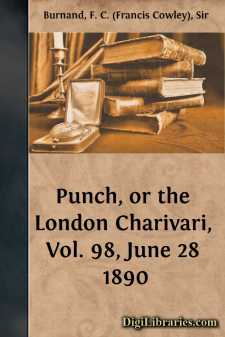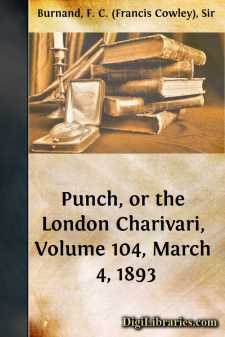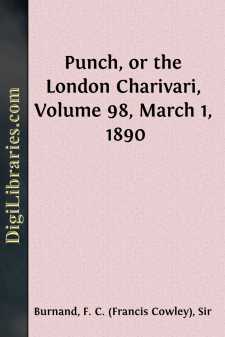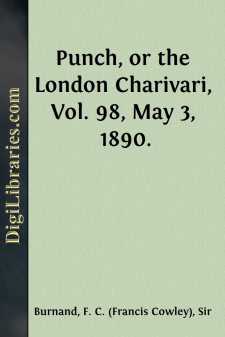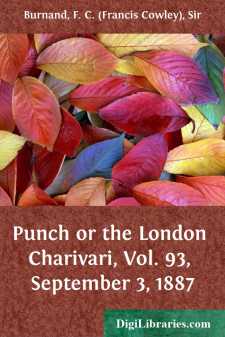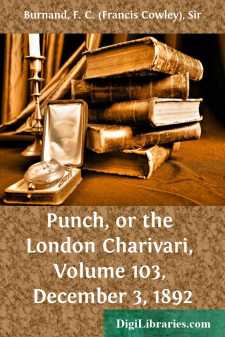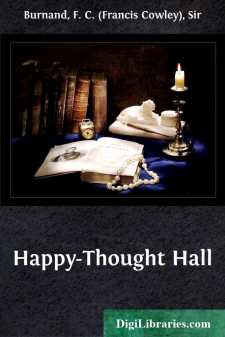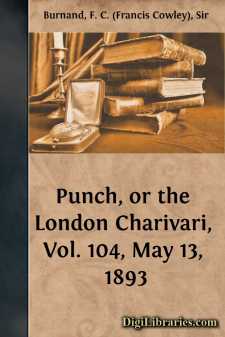Categories
- Antiques & Collectibles 13
- Architecture 36
- Art 48
- Bibles 22
- Biography & Autobiography 813
- Body, Mind & Spirit 142
- Business & Economics 28
- Children's Books 15
- Children's Fiction 12
- Computers 4
- Cooking 94
- Crafts & Hobbies 4
- Drama 346
- Education 46
- Family & Relationships 57
- Fiction 11828
- Games 19
- Gardening 17
- Health & Fitness 34
- History 1377
- House & Home 1
- Humor 147
- Juvenile Fiction 1873
- Juvenile Nonfiction 202
- Language Arts & Disciplines 88
- Law 16
- Literary Collections 686
- Literary Criticism 179
- Mathematics 13
- Medical 41
- Music 40
- Nature 179
- Non-Classifiable 1768
- Performing Arts 7
- Periodicals 1453
- Philosophy 64
- Photography 2
- Poetry 896
- Political Science 203
- Psychology 42
- Reference 154
- Religion 513
- Science 126
- Self-Help 84
- Social Science 81
- Sports & Recreation 34
- Study Aids 3
- Technology & Engineering 59
- Transportation 23
- Travel 463
- True Crime 29
Punch, or the London Charivari, Volume 98, May 17, 1890.
Categories:
Description:
Excerpt
ALL IN PLAY.
My Dear Editor,—Whilst you were feasting in Burlington House amongst the Pictures and the Royal Academicians, I was seated in the Stalls of the St. James's Theatre, lost in astonishment (certainly not in admiration, although of old the two words had the same meaning), at the antics of a minority of the Gallery, who amused themselves by shouting themselves hoarse before the performances commenced; but not satisfied with this, they continued their shrieking further: they howled at the overture of the first piece, they jeered at the scene, they yelled at the actors. However, as it happened, The Tiger had been already successfully played on two occasions last year, so a verdict was not required at their hands. Had Mr. Solomon, the composer, conducted, he would have taken The Tiger away, and left the howlers to their howling. Since Saturday the piece has, I am informed, "gone" with what the Americans call a "snap." The music is charming. Mr. Charles Colnaghi made his bow as a professional, and played and sang excellently, as did also Mr. J. G. Taylor, in spite of the riotous conduct of the "unfriendlies."
Then came Esther Sandraz. Mrs. Langtry looked lovely, and played with great power; but what an unpleasant part! Until the end of the First Act all was right. The sympathy was with the heroine of the hour, or, rather, two hours and a half; but when it was discovered that Esther loved but for revenge, and wished to bring sorrow and shame upon the fair head of Miss Marion Lea, then the sentiments of the audience underwent a rapid change. Everyone would have been pleased if Mr. Sugden had shot himself in Act II.; nay, some of us would not have complained if he had died in Act I., but the cat-and-mouse-like torture inflicted upon him by Esther was the reverse of agreeable. Mr. Sugden was only a "Johnnie," but still "Johnnies" have feelings like the rest of us. Mr. Bourchier was rather hard as a good young man who does not die, and Mr. Everill (steady old stager) kept everything well together. If the play keeps the boards for any length of time, it will be, thanks to the power of Mrs. Langtry, the natural pathos of Miss Marion Lea, and the unforced comedy of Mr. Everill.
On Monday Miss Grace Hawthorne produced Theodora at the Princess's Theatre with some success. It cannot be said, however, that Mlle. Sara Bernhardt has at length found her rival, but, for all that, the heroine of the moment might have been worse. "Sardou's masterpiece" (as the programmes have it) was very well staged. The scenery and costumes were excellent, and great relief was afforded to the more tragic tones of the play by entrusting the heavy part of Andreas to Mr. Leonard Boyne, who is a thorough artist, with just the least taste in life of the brogue that savours more of the Milesian Drama. Mr. W. H. Vernon was the Justinian of the evening, and looked the Lawgiver to the life; although I am not quite sure whether a half-concealed moustache was quite the fashion in the days of the Empire....


